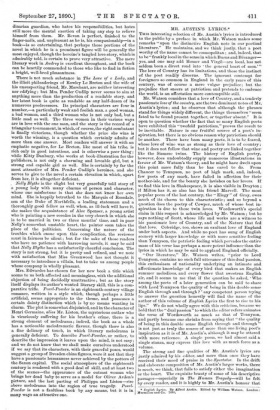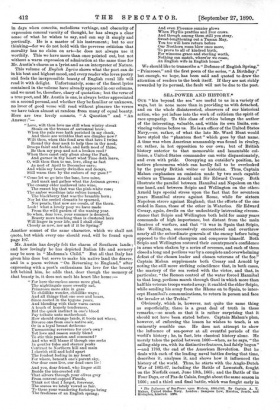MR. AUSTIN'S LYRICS.*
This interesting selection of Mr. Austin's lyrics is introduced to the public by a preface in which Mr. Watson makes some remarks "upon the distinctive English note in our poetical literature." He maintains, and we think justly, that a poet worthy of the name cannot be cosmopolitan ; and, indeed, that to be "frankly local in the sense in which BIIITIS and Belanger— yes, and one may add Homer and Virgil—are local, has not seldom been a direct road into • the general heart of men.' " The love of Country has its limitations, and these the instinct of the poet readily discerns. The ignorant contempt for foreigners so common in England in the early years of this century, was of course a mere vulgar prejudice ; but the prejudice that sneers at patriotism and pretends to embrace the world, is an affectation more contemptible still.
Mr. Watson considers that a love of Country, and a tenderly passionate love of the country, are the two dominant notes of Mr. Austin's lyrics ; and he observes that although the phrases stand for things widely different, the things themselves "seem fated to be found present together, or together absent." It is open to question whether the fact that so many English poets have exhibited this "twofold patriotism," proves the result to be inevitable. Nature is one fruitful source of a poet's in- spiration, but there is no obvious reason why patriotism should be another. There have been many poets, it is to be feared, whose love of wine was as strong as their love of country ; but it does not follow that wine and poetry are linked together like the Siamese twine. The history of English poetry, however, does undoubtedly supply numerous illustrations in favour of Mr. Watson's theory, and he might have dwelt upon this point more fully than he has cared to do. From Chaucer to Tennyson, no poet of high mark, and, indeed, few poets of any mark, have failed in affection for their mother-isle, and for the beauty she lavishes on her lovers. If we find this love in Shakespeare, it is also visible in Drayton ; if Milton has it, so also has his friend Marvell. The most popular poem of the last century, the " Elegy " of Gray, owes much of its charm to this characteristic ; and so beyond a question does the poetry of Cowper, much of whose best in- spiration is due to these twin loves. Wordsworth's special claim in this respect is acknowledged by Mr. Watson ; but he says nothing of Scott, whose life and works are a witness to his passionate love of Country, and of the Nature that fed that love. Coleridge, too, shows an exultant love of England under both aspects. And while no poet has sung of English scenery with larger knowledge or with more sensitive feeling than Tennyson, the patriotic feeling which pervades the entire mass of his verse has perhaps a more potent influence than the lyrics in which he may be said to applaud England officially.
"Our literature," Mr. Watson writes, "prior to Lord Tennyson, contains no such full utterance of this dual passion, this enthusiasm of nationality underlying an intimate and affectionate knowledge of every bird that makes an English summer melodious, and every flower that sweetens English air, and it seems to me that if the question be asked, 'Who among the poets of a later generation can be said to share with Lord Tennyson the quality of being in this double sense English through and through ' any competent person trying to answer the guestion honestly will find the name of the author of this volume of English Lyrics the first to rise to his lips." We do not wholly agree with this criticism, because we hold that the "dual passion" to which the editor refers animates the verse of Wordsworth as much as that of Tennyson, and partly because one shrinks from saying that "the quality of being in this double sense English through and through" is not just as truly the source of more than one living poet's inspiration as it is of Mr. Austin's, although it may be uttered with more reticence. A single poem, we had almost said a single stanza, may express this love with as much force as a volume.
The strong and fine qualities of Mr. Austin's lyrics are justly admired by his editor, and more than once they have received their meed of praise in the Spectator. In the drift and elaborate composition of Mr. Austin's larger works, there is much, we think, that fails to satisfy either the imagination or the heart. The exquisite beauty of some of his descriptive passages—especially in The Human Tragedy—will be felt by every reader, and it is highly to Mr. Austin's honour that
• English Lyrics. By Alfred Austin. Edited by William Watson. London: Macmillan and Co. 1*0..
in days when conceits, melodious verbiage, and obscurity of expression conceal vacuity of thought, he has always a clear sense of what he wishes to say, and can say it simply and poetically. He is a master of his instrument; but to our thinking—for we do not hold with the perverse criticism that morality has no claim on art—he does not always use it worthily. This we have more than once pointed out, but not without a warm expression of admiration at the same time for Mr. Austin's charm as a lyrist and as an interpreter of Nature.
This volume of English Lyrics shows what the poet can do in his best and highest mood, and every reader who loves poetry and feels the inexpressible beauty of English rural life will read it with delight. Unfortunately, some of the finest lyrics contained in the volume have already appeared in our columns, and we must be, therefore, chary of quotation; but the verse of a true poet, and Mr. Austin is one, is always better appreciated on a second perusal, and whether they be familiar or unknown, no lover of good verse will read without pleasure the verses we have taken almost at random from many of equal beauty. Here are two lovely sonnets, "A Question" and " An Answer :"— " Love, wilt thou love me still when wintry streak Steals on the tresses of autumnal brow;
When the pale rose hath perished in my cheek, And those are wrinkles that are dimples now P Wilt thou, when this fond arm that here I twine Round thy dear neck to help thee in thy need, • Droops faint and feeble, and hath need of thine, Be then my prop and not a broken reed ? When thou canst only glean along the Past,
And garner in thy heart what Time doth leave, 0, wilt thou then to me, love, cling as fast
As nest of April to December save; And while my beauty dwindles and decays, Still warm thee by the embers of my gaze P" " Come let us go into the lane, love mine, And mark and gather what the Autumn grows ; The creamy elder mellowed into wine, The russet hip that was the pink-white rose; The amber woodbine into rubies turned, The blackberry that was the bramble born; Nor let the seeded clematis be spurned, Nor pearls, that now are corals, of the thorn. Look ! what a lovely posy we have made From the wild garden of the waning year. So when, dear love, your summer is decayed, Beauty more touching than is clustered here Will linger in your life, and I shall cling Closely as now, nor ask if it be Spring.'
Another sonnet of the same character, which we shall not quote, but which every one should read, will be found upon page 107.
Mr. Austin has deeply felt the charm of Southern lands ; • and how lovingly he has depicted Italian life and scenery may be seen in "Madonna's Child." But all that Italy has given him does but serve to make his native laud the dearer, and in a poem written "On Returning to England," after expressing with a poet's enthusiasm his love for the beauty left behind him, he adds that, dear though the memory of that beauty is, it does not melt his heart like home :—
" For here the cuckoo seems more glad,
The nightingale more sweetly sad, Primroses more akin in gaze To childlike wonder, childlike ways ;
And all things that one sees and hears,
Since rooted in the bygone years, And blending with their warm caress A touch of homely tenderness, Bid the quick instinct in one's blood Pay tribute unto motherhood.
How should strange lands, it boots not where, Divorce one from one's native air, Or in a loyal breast dethrone Unreasoning reverence for one's own ?
Yet love and reason surely blend To stir this passion and commend ?
And who will blame if though one seeks In gentler tides and sterner peaks Contrast to Northern hill and main I cherish still and hold apart The fondest feeling in my heart For where, beneath one's parent sky, -Our dear ones live, our dead ones lie !
And you, dear friend, who linger still Beside the iris-crested rill That silvers through your olives grey From convent-capped Fiesole, Think not that I forget, forswear, The scenes we lately vowed so fair. To these your wandering footsteps bring The freshness of an English spring; And even Florence sunnier glows When Phyllis prattles and Ivor crows. And though among them still you stray, Sweet-lengthening out a Tuscan May, You too will here return before Our Northern roses blow once more, To prove to all of kindred birth, For winsome grace and sterling worth, Nothing can match, where'er we roam, An English wife in English home."
We should like to transcribe a "Defence of English Spring," "Primroses," and the first poem of the series, "A Birthday ;" but enough, we hope, has been said and quoted to draw the attention of readers to the book itself. If they are not richly rewarded by its perusal, the fault will not be due to the poet.



































 Previous page
Previous page